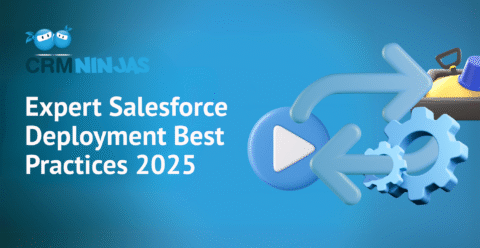Leveraging Salesforce for marketing campaigns can mark a turning point in how businesses engage with their audience. Salesforce provides robust tools and features to streamline marketing efforts, offering the potential to transform strategies, increase engagement, and boost conversion rates.
Having access to Salesforce’s extensive tools and features is one thing; possessing the knowledge and skills to implement and utilize them strategically is another. The success and viability of Salesforce for your team hinges on taking advantage of these untapped advantages.
In this article, you will learn
- How Salesforce optimizes marketing campaign management.
- Strategies to leverage Salesforce features for marketing.
Let’s dive in and uncover how, with the right approach, Salesforce can transform your marketing game, making it all fun and games with serious results.
The Salesforce Advantage in Marketing
Salesforce stands at the forefront of CRM solutions, not just for its ability to manage customer relationships but also for its powerful marketing capabilities.
With Marketing Cloud and Marketing Cloud Account Engagement (MCAE), formerly known as Pardot,, Salesforce goes beyond traditional CRM functions, enabling marketers to craft personalized, data-driven campaigns with ease. The platform’s emphasis on data and analytics allows businesses to gain deep insights into customer behavior, preferences, and engagement patterns.
Integrating Salesforce for marketing campaigns offers several advantages:
Personalization at Scale: Salesforce’s robust data management and analytics capabilities enable marketers to segment audiences and tailor messages precisely, ensuring each customer receives relevant and engaging dynamic content.
Efficient Campaign Management: Tools like Journey Builder allow for the automation of marketing workflows, from email marketing to social media campaigns, ensuring that no touchpoint is missed.
Enhanced Measurement and Optimization: With Salesforce’s comprehensive analytics, marketers can measure the effectiveness of their campaigns in real time, allowing for quick adjustments and optimization to drive better results.
Adopting Salesforce for marketing campaigns frees your business from a one-size-fits-all approach to a more nuanced and impactful marketing strategy that resonates with its target audience, setting the stage for sustained growth and success.
Strategies to Leverage Salesforce for Marketing Campaigns
Successfully integrating Salesforce into your marketing strategy involves more than just understanding its features; it requires a thoughtful approach to leveraging its full potential. Here are several strategies that can help businesses maximize the impact of their marketing campaigns using Salesforce:
Audience Segmentation and Targeting
Use Salesforce’s data management tools to segment your audience based on targeted, personalized ad campaigns. This enables the creation of targeted campaigns that speak directly to the needs and interests of different customer groups.
Segmentation can be broken into three groups:
- Demographic
- Psychographic
- Behavioral
Demographic — Based on objective, statistical aspects of a population or organization, such as age, gender, income, company size, and industry.
A financial services provider could create a segment for working professionals (ages 25-45) and advertise mortgage services, investment accounts, and family insurance plans. This segment could even highlight which channels are most effective for campaigns, such as LinkedIn over Instagram.
Psychographic — This category dives into the subjective traits of the audience, such as personalities, values, attitudes, interests, and lifestyles. Psychographic segmentation allows marketers to address underlying reasons behind consumer behaviors and preferences, enabling more emotionally resonant marketing strategies.
Using self-reported identifiers and in-app behavioral statistics, a fitness software provider could create segmentation built around the psychology of health enthusiasts, busy careers, and weight loss. These segments help predict which promotions or offers these groups will most likely engage with.
Behavioral — This focuses on how consumers interact with products, services, and technologies. It looks at patterns such as purchase history, brand interactions, product usage, and technology adoption. Behavioral segmentation is crucial for understanding consumer habits and predicting future behaviors, allowing for highly personalized and timely marketing efforts.
For example, marketing segmentation based on purchase history can be an effective way to predict your customer’s future desires and interests. A segment identifying customers who frequently purchase children’s clothes could be leveraged by an online retailer to advertise back-to-school sales.
Salesforce Automation for Marketing Campaigns
Implement Salesforce’s automation features to streamline campaign execution, identify your audience, and queue leads into your sales funnel or specific campaign sequence.
Using touchpoint data, Salesforce begins organizing and scoring qualified and priority leads. For example, webinar sessions, downloads — such as white paper downloads via email and website — and engagement, like trade show attendance, can all be rated and sorted according to the most strategic next steps.
This data will allow automation to trigger email sequences, social media posts, and personalized customer journeys based on behavior and schedules, ensuring consistent and timely engagement with your audience.
According to a DemandGen Report, on average, nurtured leads produce a 20% increase in sales opportunities compared to unnurtured leads. The Annuitas Group states businesses leveraging marketing automation for lead outreach experience a 451% increase in qualified leads.
Data-Driven Decision Making
Salesforce’s allows you to harness and unify your data and analytics tools to unlock cross-team insights into campaign performance. This data can inform future marketing strategies, helping you to refine your approach and invest in the most effective tactics.
Einstien insights provides report visualizations and streamlined sharing features that allow teams to quickly analyze and collaborate on campaign data for effective next-step decisions.
Continuous Learning and Adaptation
The digital marketing landscape is ever-evolving, and so are Salesforce’s capabilities. Stay updated on new features and best practices by participating in Salesforce communities and training resources. Adapting your strategy in response to new insights and Salesforce updates will keep your marketing efforts effective and competitive.
- Invest in continuing Salesforce for marketing training
- Follow CRM experts such as CRMNinjas, Salesforce Ben, Focus on Force, and Automation Champion for updates, tips, tricks and insights.
- Partner with a consultant to audit your current Salesforce for marketing strategies and workflows and identify opportunities for optimization.
By implementing these strategies, businesses can not only enhance their marketing campaigns but also create more meaningful and lasting relationships with their customers. Salesforce, when leveraged correctly, becomes more than a tool—it becomes a strategic partner in driving marketing success.
Up Your Salesforce for Marketing Game with CRMNinjas
From strategic audience segmentation to data-driven decision-making, Salesforce empowers marketers to deliver personalized and impactful campaigns. However, realizing the full potential of Salesforce for your marketing efforts can be complex, requiring deep expertise and strategic insight. This is where CRMNinjas steps in.
As specialists in Salesforce administration and consulting, CRMNinjas has a team of professionals with the in-depth knowledge and experience needed to tailor Salesforce solutions to your unique marketing needs.
By partnering with CRMNinjas, you can:
- Unlock advanced Salesforce features and integrations that elevate your marketing campaigns.
- Benefit from customized strategies that leverage Salesforce’s analytics and AI capabilities for smarter decision-making.
- Long-term partnership to ensure marketing and sales efforts are continuously aligned and perfected through expert Salesforce implementation.
- Access to expert training and on-demand training
Whether you’re looking to refine your current Salesforce setup for marketing or embark on a new Salesforce-powered marketing strategy, CRMNinjas is your ideal partner. With a focus on delivering measurable results and enhancing customer relationships, CRMNinjas can help you transform your marketing campaigns and achieve your business objectives.
Ready to take your marketing campaigns to the next level with Salesforce? Let’s schedule a consultation.
Frequently Asked Questions
How is Salesforce used in marketing?
Salesforce is employed in marketing to manage customer relationships, segment audiences, automate marketing workflows, and analyze campaign performance. It enables the creation of targeted and personalized marketing strategies that resonate with various customer segments, leveraging data and analytics to optimize engagement and conversion rates.
What are marketing campaigns in Salesforce?
In Salesforce, marketing campaigns are organized efforts to promote products or services through various channels, leveraging Salesforce’s tools to segment audiences, automate outreach, and track the effectiveness of these campaigns. Salesforce campaigns can include email marketing, social media outreach, and other digital marketing strategies, all designed to achieve specific marketing objectives.
Is Salesforce a good marketing tool?
Yes, Salesforce is considered a highly effective marketing tool. It offers a comprehensive suite of features for managing customer data, automating marketing processes, and providing insights into campaign performance. Salesforce’s ability to personalize marketing efforts and measure their impact makes it a valuable asset for marketers looking to enhance their campaigns and drive business growth.
Is Salesforce a campaign management tool?
Yes, Salesforce functions as a campaign management tool, providing marketers with the resources to plan, execute, and analyze marketing campaigns. It supports the management of campaign workflows, segmentation of target audiences, automation of marketing communications, and assessment of campaign performance, thereby facilitating effective and efficient marketing campaign management.






